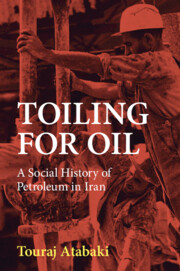Book contents
- Toiling for Oil
- Toiling for Oil
- Copyright page
- Dedication
- Contents
- Figures
- Maps
- Tables
- Note on Transliteration
- Preface and Acknowledgments
- Chronology
- Introduction
- 1 Oil Discovery and the Formation of a New Iranian Society
- 2 Oil and Labour in the First World War
- 3 Oil and Authoritarian Modernisation During Interwar Period
- 4 The Second World War: The Great Powers’ Rivalry for Oil
- 5 Poised to Leap: Towards Oil Nationalisation
- 6 Sovereignty’s Interlude: Iran’s Oil in 1951–1954
- 7 From Disparity to Planned Development: 1954–1962
- 8 Oil, Workforce, and the Developmental State: 1960s–1970s
- 9 Shop Floor Labour Activism: From the White to the Islamic Revolution
- Epilogue
- Notes
- Bibliography
- Index
7 - From Disparity to Planned Development: 1954–1962
Published online by Cambridge University Press: 28 November 2024
- Toiling for Oil
- Toiling for Oil
- Copyright page
- Dedication
- Contents
- Figures
- Maps
- Tables
- Note on Transliteration
- Preface and Acknowledgments
- Chronology
- Introduction
- 1 Oil Discovery and the Formation of a New Iranian Society
- 2 Oil and Labour in the First World War
- 3 Oil and Authoritarian Modernisation During Interwar Period
- 4 The Second World War: The Great Powers’ Rivalry for Oil
- 5 Poised to Leap: Towards Oil Nationalisation
- 6 Sovereignty’s Interlude: Iran’s Oil in 1951–1954
- 7 From Disparity to Planned Development: 1954–1962
- 8 Oil, Workforce, and the Developmental State: 1960s–1970s
- 9 Shop Floor Labour Activism: From the White to the Islamic Revolution
- Epilogue
- Notes
- Bibliography
- Index
Summary
A transformative period in Iran’s oil industry was heralded by the entry of an international oil consortium, initiating a new era in exploration, refining, and global marketing of Iranian oil, characterised by a shift from British to predominantly American leadership. The consortium’s early initiatives included transferring all non-industrial services, such as education, health, and housing – previously managed by the Anglo-Iranian Oil Company – to a newly established department within the National Iranian Oil Company, now known as the Organisation of Non-Industrial Tasks. Additionally, the consortium significantly reduced the industry’s workforce, leading to widespread unemployment among various worker segments in Iran. This economic downturn, where the rising cost of living was unaligned with wages, incited labour protests within the oil industry. The analysis also probes into a significant challenge faced by the Iranian government and its primary supporter, the United States: navigating the substantial hurdles during this era. This examination offers profound insights into the complex interplay between international business interests, local economic conditions, and labour dynamics amid the geopolitical shifts that were reshaping the socio-economic landscape of Iran during this critical juncture.
Keywords
- Type
- Chapter
- Information
- Toiling for OilA Social History of Petroleum in Iran, pp. 224 - 250Publisher: Cambridge University PressPrint publication year: 2024

